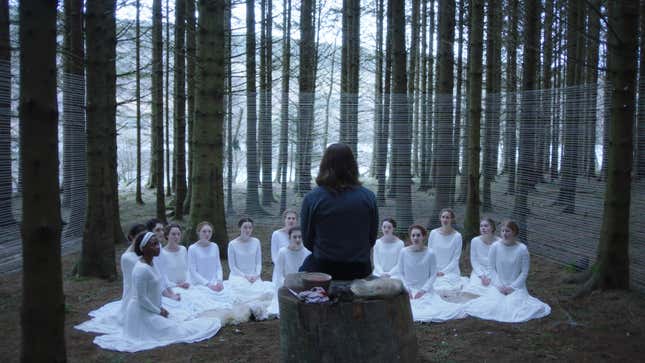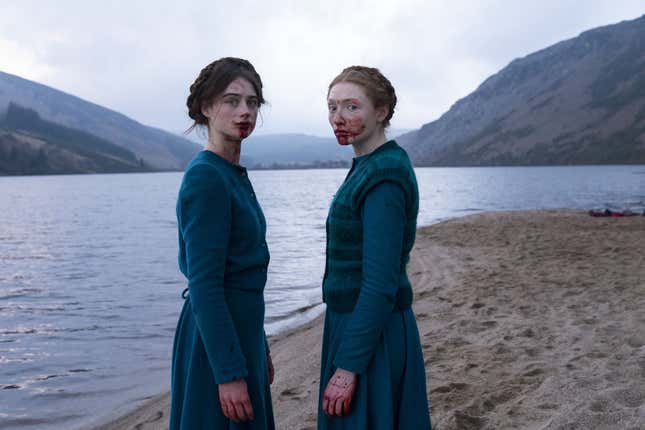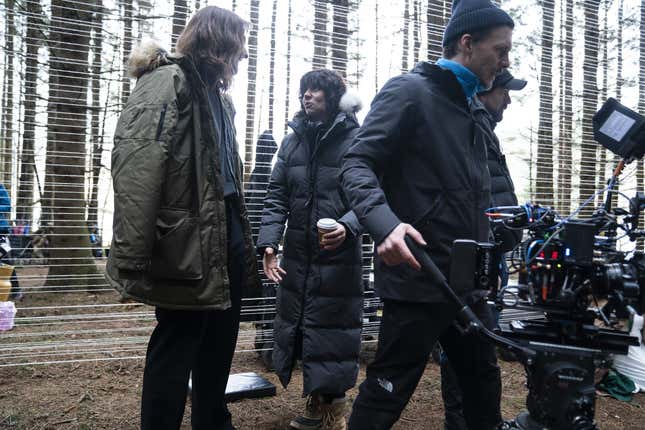The Other Lamb Director Małgorzata Szumowska On Releasing a Movie During a Pandemic
Entertainment

Virtually every shot of acclaimed Polish director Małgorzata Szumowska’s English-language debut, The Other Lamb, looks like a work of art. So arresting are the movie’s visuals, the result of a near-psychic connection between Szumowska and her trusty director of photography Michal Englert, that they might make you feel a sense of loss. Had things gone according to plan, we’d be able to look at this gorgeous movie about a patriarchal cult leader known as the Shepherd (Michiel Huisman) and the flock of women he commands (and abuses and takes sexual advantage of) on the big screen, where it belongs. Instead, the movie’s distributor, IFC Midnight, will drop it on VOD on Friday.
It looked stunning nonetheless when I watched it on my flatscreen last week, I assured Szumowska last week, when I interviewed her by phone. Locked down in the Polish countryside, she expressed disappointment that things had gone the way they had, but still saw this as a potential opportunity. We discussed her connection to the movie, which unlike the rest of her films, she did not write—instead Australian writer C. S. McMullen wrote the script, which made it to the Black List collection of highly coveted screenplays before being scooped up and filmed by Szumowska. Szumowska said she particularly identified with her protagonist, Selah (Raffey Cassidy), whose coming of age triggers a questioning of the authority she was raised to accept blindly.
I thought Szumowska’s choice to make dream sequences flow into reality so that you couldn’t tell her oppressed characters’ waking nightmares from their sleeping ones, was ingenious. The cult frequently worships inside of a design of ribbons placed around trees (see the still above)—it’s a gorgeous way of conveying that they’re trapped while free to leave at any time. The Other Lamb was filmed in rural Ireland, though the time and place are never quite specified, giving the whole thing a fairytale sensibility.
A transcript of my discussion with Szumowska about her film appears below. It has been edited for length and clarity.
JEZEBEL: What is it like releasing a movie during a global crisis?
MAŁGORZATA SZUMOWSKA: I’m disappointed by the fact that it won’t be released in IFC Cinemas in New York and L.A. The Other Lamb is such a visual film. You’re losing part of the magic if you’re watching on a laptop, etc. But on the other hand, with people staying at home, this is an opportunity for them to see something new. Maybe it’s going to work?
Patriarchy is also like a coronavirus.
What are your thoughts about putting something into the world that isn’t related to the thing that everyone is thinking about at every moment? Are you happy to provide a distraction?
I’m kind of happy to do that. But maybe I’m going to make them even more depressed than they are! If it were a comedy, maybe I would be more happy about it, but unfortunately, it’s not a comedy. It’s not very positive.
“Don’t think about the coronavirus; think about patriarchy!”
Yes. Patriarchy is also like a coronavirus.

What is it like collaborating with the Michal Englert on the visuals? Do you just leave it up to him or do you help inform the composition of the shots?
We did all my films together, but also, he’s co-written with me. We are really [in sync]. If I see a tree, he knows what I see. In a sense, we are one person. We see the same. Of course, he delivers it with technique and lenses. On the set, he makes decisions by himself. It’s very organic, our collaboration. It’s hard to imagine working with someone else. I think this is his best work in his career, and he’s really disappointed it won’t be in cinemas.
The Other Lamb originated as a Black List script. What was it like to pursue and secure that?
All my film career, I never thought about making an American film. Now, all the younger generation of filmmakers are dreaming constantly about that. To me, after I won the Silver Berlin Bear at the Berlin Film Festival [for 2015’s Body], they start to send me English scripts. I started to have an agency in the U.S. But I would always pass on everything. I didn’t like those scripts. I couldn’t find any connection with my soul, with my sensibility. [With The Other Lamb], I found so many interesting things in the script. I immediately said, “I’m in.” It took nine months [to start shooting]. In Europe, if you finally have money from the government, you are shooting the film. [With this], you didn’t know what was going to happen because it’s private money. People change their minds. To me, this was a new experience. It just kind of happened. I’m friends with European filmmakers who are like, “I’m going to have an American career.” I have doubts, really. I’m just trying to explain to them that it’s not as easy as they think.
Was it so difficult as to turn you off from making another English-language feature?
After we wrapped, I was so tired. In the editing, you are receiving notes from so many people and you really don’t know what the fuck is going on. When you’re making a movie in Europe, no one is telling you what to do. “Do that do that do that do this.” I’m very happy with the results, but tired of the process. I jumped to an arthouse, written-by-me, German-Polish co-production and we are trying to release it online. It was amazing to come back to my roots. I can do whatever I want. It was so, so different. But at the end of the day, I’m missing the American experience. Maybe I’m the kind of person that will make one American movie, one Polish movie.

In your director’s statement, you describe The Other Lamb as “a film for modern times; a dark cry against the patriarchy.” Is that what attracted you to this story?
It was many, many things but one of the most important elements was filming with an all-female cast with one [male] actor. As an experiment it was interesting. And also the journey of her, from a teenager to a woman, to see her rising sexuality. This was something very important to me.
The women in the portrayed cult aren’t allowed to tell stories; that this should be a plot point in a movie written and directed by women seemed pointed, given the relative lack of women filmmakers.
I’ve seen so many doors starting to open for women directors. Not in Poland, but definitely I see a bigger interest coming from the U.S. In the English-speaking market, they are really searching for female directors. Maybe something good is happening finally. I hope so, but when you look at the numbers, it’s a joke.
I wonder what you think about genre. IFC Midnight, a label known for horror, is distributing this, and certainly, there are horrific elements, but it doesn’t quite strike me as a horror movie. Do you think it is?
No, not really. It’s not a horror movie, it’s more of a psychological thriller. Before I watched many horror films because I was trying to prepare myself to make a “horror movie,” but at the end of the day, it’s not a typical horror movie. In general, I like some horror movies, like Get Out for example. The best is The Shining. I have nothing against horror films; I could do a horror film, no problem. They touch on anxiety in us, and I think it’s a lot to discover. But I don’t think The Other Lamb is a horror movie. It’s something in between. I’m much closer now as a director to doing a genre film than I was before. When you do eight arthouse films in a row, it makes you tired. I’m ready to do some genre now.